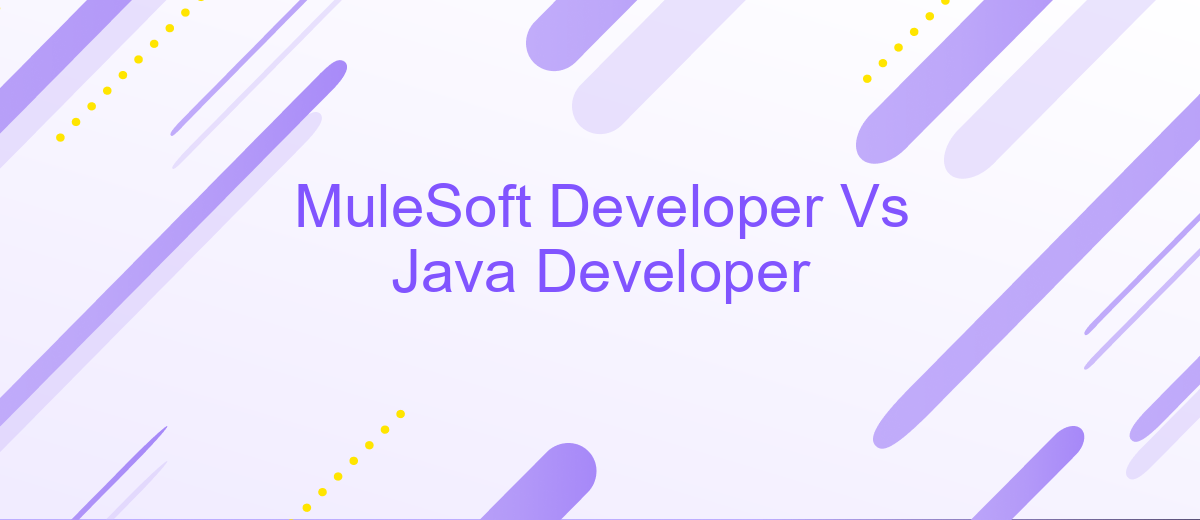MuleSoft Developer Vs Java Developer
In the rapidly evolving tech landscape, the roles of MuleSoft Developers and Java Developers are increasingly critical. While both play pivotal roles in software development, they specialize in different areas. MuleSoft Developers focus on integration solutions using MuleSoft's Anypoint Platform, whereas Java Developers excel in building robust, scalable applications using the Java programming language. This article explores the key differences and overlaps between these two vital roles.
Introduction
In the ever-evolving landscape of software development, two prominent roles often come into focus: MuleSoft Developer and Java Developer. Both of these roles play crucial parts in the creation and maintenance of software systems, yet they differ significantly in their core responsibilities and skill sets. Understanding these differences can help organizations make informed decisions when building their development teams.
- MuleSoft Developer: Specializes in integrating various systems using MuleSoft's Anypoint Platform.
- Java Developer: Focuses on building and maintaining applications using the Java programming language.
- Integration Tools: MuleSoft Developers often utilize tools like ApiX-Drive to streamline integration processes.
While Java Developers are generally tasked with creating robust, high-performance applications, MuleSoft Developers are experts in connecting disparate systems to ensure seamless data flow. Both roles require a deep understanding of their respective technologies, but MuleSoft Developers often need additional expertise in integration platforms and tools. By recognizing the unique strengths of each role, businesses can better align their development strategies to meet their specific needs.
Role Responsibilities

A MuleSoft Developer is primarily responsible for designing, building, and maintaining integrations using the MuleSoft platform. They work closely with business analysts and stakeholders to gather requirements and translate them into technical specifications. Their role involves creating APIs, connecting various systems, and ensuring seamless data flow across platforms. MuleSoft Developers also focus on optimizing performance, troubleshooting issues, and ensuring robust security measures. Utilizing tools like ApiX-Drive, they can streamline the integration process, making it easier to connect different applications and automate workflows.
On the other hand, a Java Developer focuses on designing, implementing, and maintaining Java-based applications. They collaborate with software engineers and system architects to develop high-performing, scalable, and reliable software solutions. Java Developers write clean, efficient code, conduct thorough testing, and perform debugging to ensure the application meets quality standards. They are also responsible for integrating third-party services, optimizing application performance, and staying updated with the latest Java technologies and frameworks. Their role requires a deep understanding of object-oriented programming, data structures, and algorithms.
Technical Skills

MuleSoft Developers and Java Developers possess distinct technical skills tailored to their specific roles. MuleSoft Developers specialize in integration solutions, leveraging the Anypoint Platform to design and implement APIs, integrations, and data flows. They are proficient in DataWeave, MuleSoft's expression language, and have a deep understanding of RESTful and SOAP web services. On the other hand, Java Developers focus on building robust applications using Java programming language. They excel in object-oriented programming, multithreading, and design patterns, with expertise in frameworks like Spring and Hibernate.
- MuleSoft Developers: Anypoint Platform, DataWeave, RESTful and SOAP web services, API design, integration solutions, ApiX-Drive.
- Java Developers: Java programming, object-oriented programming, multithreading, Spring framework, Hibernate, design patterns.
Both roles require strong problem-solving skills and the ability to work collaboratively in a team environment. While MuleSoft Developers focus on seamless integration and data flow management, Java Developers concentrate on building scalable and high-performance applications. Understanding the unique technical skills of each role is crucial for organizations to leverage their strengths effectively.
Career Growth

Both MuleSoft and Java developers have promising career growth opportunities, albeit in different directions. MuleSoft developers specialize in integration solutions, which are increasingly in demand as businesses seek to connect various applications and data sources seamlessly. As organizations continue to adopt digital transformation strategies, the need for skilled MuleSoft developers will only grow.
On the other hand, Java developers enjoy a broad range of opportunities across different industries. Java remains one of the most popular programming languages, powering everything from enterprise applications to Android apps. This versatility ensures that Java developers can find roles in diverse sectors, including finance, healthcare, and technology.
- MuleSoft Developer: Focus on integration solutions, often using platforms like ApiX-Drive for seamless connectivity.
- Java Developer: Versatile roles in various industries, from web development to mobile applications.
Ultimately, the choice between becoming a MuleSoft developer or a Java developer depends on your career goals and interests. If you are passionate about integration and connecting systems, MuleSoft offers a specialized yet growing field. Conversely, if you prefer a more versatile role with opportunities across multiple domains, Java development may be the better choice.
Conclusion
In conclusion, both MuleSoft Developers and Java Developers play crucial roles in the tech ecosystem, each with their unique strengths and specializations. MuleSoft Developers excel in creating seamless integrations using the MuleSoft Anypoint Platform, making them invaluable in environments where connecting various systems and services is a priority. On the other hand, Java Developers bring robust programming skills to the table, capable of building complex applications from the ground up, ensuring high performance and scalability.
Choosing between these two roles depends on the specific needs of a project. If the focus is on integration and streamlining workflows across different platforms, leveraging tools like ApiX-Drive for automated integrations can be highly beneficial, making the expertise of a MuleSoft Developer essential. Conversely, if the project demands intricate software development with a strong emphasis on core application logic, a Java Developer's skill set becomes indispensable. Both roles complement each other, and the best outcomes often arise from a collaborative effort between these specialized professionals.
- Automate the work of an online store or landing
- Empower through integration
- Don't spend money on programmers and integrators
- Save time by automating routine tasks
FAQ
What is the primary role of a MuleSoft Developer?
How does a Java Developer differ from a MuleSoft Developer?
Can a Java Developer transition to a MuleSoft Developer role easily?
What tools do MuleSoft Developers commonly use?
How can businesses automate and streamline their integration processes?
Apix-Drive is a universal tool that will quickly streamline any workflow, freeing you from routine and possible financial losses. Try ApiX-Drive in action and see how useful it is for you personally. In the meantime, when you are setting up connections between systems, think about where you are investing your free time, because now you will have much more of it.


